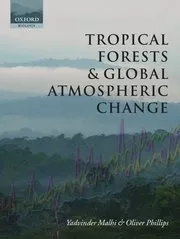Professor Yadvinder Malhi
Professor of Ecosystem Science
Programme Leader in Ecosystems Research, ECI
Jackson Senior Research Fellow at Oriel College, Oxford
Member of the Environment Research Doctoral Training Partnership
Professor of Ecosystem Science
Programme Leader in Ecosystems Research, ECI
Jackson Senior Research Fellow at Oriel College, Oxford
Member of the Environment Research Doctoral Training Partnership
Academic Profile
Yadvinder Malhi CBE FRS is Professor of Ecosystem Science at the Environmental Change Institute, School of Geography and the Environment, and Senior Research Fellow at Oriel College.
Professor Malhi explores the functioning of the biosphere and its interactions with global change, including climate change. He has a particular fascination with and love for tropical forests, though he has recently been spotted in ecosystems ranging from savannas, the Arctic, tropical coral reefs and Oxfordshire's woodlands and floodplain meadows.
He looks at how natural ecosystems may be shifting in response to global atmospheric change, and how protecting or restoring natural ecosystems can help tackle climate change, and help adaptation to the consequences of climate change.
His team at the Environmental Change Institute is known for collecting intensive field data from fascinating but sometimes tough and remote forests. They have ongoing programmes of research in Asia, Africa, the Amazon and Andes regions, and Oxford's own Wytham Woods. A new recent focus has been on nature recovery and biodiversity restoration in the UK.
While addressing fundamental questions about ecosystem function and dynamics, his research findings are significant for conservation and adaptation to climate change. He is a Trustee of the Natural History Museum of London, President-Elect of the British Ecological Society, chairs a number of programmes on biodiversity at the Royal Society, and is a scientific advisor on nature restoration for the UK government and the government of Scotland.
He leads an active Ecosystem Dynamics research lab focussing on forest vegetation-atmosphere interactions, employing field studies, satellite remote sensing and ecosystem modelling.
Current Research
The broad scope of my research interests is the impact of global change on the ecology, structure and composition of terrestrial ecosystems, and in particular temperate and tropical forests, though recently I have been spotted a few times in the Antarctic and Arctic … This research addresses fundamental questions about ecosystem function and dynamics, whilst at the same time providing outputs of direct relevance for conservation and adaptation to climate change. We apply a range of techniques including field physiological studies, large-scale and long-term ecological monitoring, social sciences methods, satellite remote-sensing and GIS, ecosystem modelling, and micrometeorological techniques.
My team has a reputation in collecting intensive field data from fascinating but sometimes tough and remote forests, and linking these data to models and satellite data to address global issues surrounding tropical forests.
My university post is supported by the Jackson Foundation, and our global research is funded by grants from the European Research Council, the Natural Environment Research Council, and others.
Drone Shots
Teaching and Supervision
Prof. Malhi teaches on biodiversity and ecosystem assessment techniques for the MSc in Biodiversity Conservation and Management. He also teaches on tropical forests, environmental modelling and GIS/remote sensing for the MSc in Environmental Change and Management, for which he is also an internal examiner.
Current Graduate Research Students
| Tina Christmann |
Remote sensing to assess ecosystem change and restoration in tropical mountain ecosystems |
| Trisha Gopalakrishna |
Forest Restoration in India: Opportunities and Realities |
| Victoria Maguire-Rajpaul |
Understanding West African cocoa smallholders' adaption to drought: assessing interactions between institutions, poverty and resilience |
| Laura Picot |
Food crops and the role of farmers' gender and intersectional identities in shaping climate resilience in Ghana |
| Huanyuan Zhang |
Calculate tropical NPP by upscaling empirical findings from plot-level forest inventory to a larger scale |
Recent Graduate Research Students (since 2006)
| Nicolas Raab Completed DPhil in 2020 |
Modelling tree carbon allocation, gas and energy exchange in the Amazon through functional structural models |
| June Rubis Completed DPhil in 2020 |
(Re)imagining forest conservation landscapes and development pathways: indigenous strategies in Sarawak, Malaysian Borneo |
| Anabelle Cardoso Completed DPhil in 2019 |
The role of fire and elephants in shaping a central African forest-savannah mosaic |
| Agne Gvozdevaite Completed DPhil in 2019 |
The role of economic, venation and morphological leaf traits in plant and ecosystem function along forest-savannah gradients in the tropics |
| Toby Jackson Completed DPhil in 2019 |
Tree biomechanics: a study of the mechanical stability of broadleaf trees |
| Christine Moore Completed DPhil in 2019 |
Complex Mosaic Landscapes: Novel methodologies to understand dynamics of Cocoa farming in Ghana |
| Festus Asaaga Completed DPhil in 2018 |
Land rights, tenure security and sustainable land use in rural Ghana |
| Meghan Bailey Completed DPhil in 2017 |
Robust adaptation planning and decision-making: a comparative study of subsistence-oriented communities in the Indo-Gangetic Plain and West Africa |
| Ewan Macdonald Completed DPhil in 2017 |
Clouds on the horizon: identifying global priorities for conservation marketing and planning the conservation of the Sunda clouded leopard on Borneo |
| Cecilia Chavana-Bryant Completed DPhil in 2016 |
Impacts of leaf age on the spectral and physiochemical traits of trees in Amazonian forest canopies |
| Tahia Devisscher Completed DPhil in 2016 |
Wildfire under a changing climate in the Bolivian Chiquitania: a social-ecological systems analysis |
Selected Publications
Many of these papers are available for download from Prof. Malhi's personal website.







